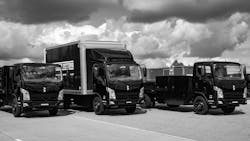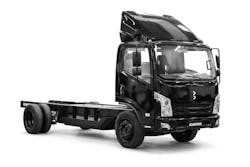Bollinger Motors moves from EV startup to production
Commercial electric vehicle startup Bollinger Motors recently announced the start of production for its Bollinger B4 Chassis Cab. First deliveries are expected in October.
Established in 2015 by Robert Bollinger, the company’s founder believes this production milestone will propel Bollinger into the category of “a true OEM,” he told FleetOwner back in March at NTEA’s Work Truck Week.
“Once we have a true production vehicle out for sale, we’re an OEM,” he said.
If Bollinger’s B4 vehicle production and deliveries take place as scheduled, it will mark one decade since the EV startup began its journey to become a “true OEM.” For nearly 10 years, Bollinger and his team have researched, developed, designed, redesigned, changed customer targets, and relocated headquarters hundreds of miles away, all while seeking capital, supplier partners, and production capacity.
Why does it take this long to go from a vehicle startup to an OEM?
Every case is different. If you go all the way back to Ford, it took establishing three companies over four years to settle on Ford Motor Company back in 1903. The automaker became profitable within 100 days.
Turning to the 21st century, EV manufacturer Tesla took a decade to turn a profit—and this came after multiple leadership changes and scrapping an entire vehicle design.
Electric SUV and pickup truck manufacturer Rivian took 12 years from its 2009 founding before it began producing the R1T in 2021. While Rivian has found funding success and is currently in production for multiple models, the company is yet to make a profit.
See also: The road to becoming an OEM
The Bollinger Motors story
Much like Ford, Tesla, and Rivian, Robert Bollinger started Bollinger Motors from the ground up. After working decades in advertising, Bollinger had the funds to “start his childhood dream,” which was to own his own car company, states a biography on the Bollinger Motors’ website.
He founded Bollinger Motors in upstate New York in 2015, and within two years, revealed a prototype of the B1, an all-electric Class 3 SUV, in New York City. In 2018, Robert Bollinger and his team moved the company headquarters to the Motor City—Ferndale, Michigan, to be exact.
The move was necessary for multiple reasons. The “wealth of talent” in the Detroit area and having “proximity to vendors” were two reasons Bollinger told Curbed Detroit. The Detroit News reported that the company desired to take advantage of Detroit’s “deep engineering and automotive resources.”
Bollinger Motors’ being in Detroit is what Jim Connelly, the company’s chief revenue officer, believes sets it apart from other EV startups and OEMs.
“Being in Detroit, we have Detroit grit,” Connelly told FleetOwner. “We have the heritage and the people that are associated with Motor City. ... The people we hire are all experienced individuals who love the product and are interested in the future of going green. That's a big part of it, too, as you move away from that gas engine and you look to your family and what you leave as a legacy to your children, having the idea of building an electric vehicle in Detroit, and having that perspective is what sets us apart."
After the move to Detroit, Bollinger Motors unveiled its B2 pickup truck in 2019.
See also: Fleets Explained: Emissions regulations
In 2020, the company moved its headquarters to Oak Park, Michigan, to a facility four times larger than the one in Ferndale. According to a Bollinger Motors press release, the company needed a larger office for its expanding team.
After years of developing the B1 and B2 for consumers, Bollinger Motors shifted gears to focus solely on commercial products in early 2022. Since then, the manufacturer has put much of its focus on the B4, a cabover design that will support vehicles in Classes 3-6.
By September 2022, Mullen Automotive, a Brea, California-based manufacturer of light-duty electric consumer vehicles and commercial vehicles, acquired a controlling interest in Bollinger. The acquisition aimed to “propel [Mullen] into the medium-duty truck Class 3-6, along with the B1 and B2 sports utility trucks,” Mullen stated in a press release. Bollinger Motors would “leverage Mullen’s solid-state battery technology and expertise,” as a result.
The acquisition appears beneficial for Bollinger Motors. Since September 2022, the burgeoning OEM Bollinger has announced:
- A joint development project with Wabash
- Our Next Energy as a battery supplier
- Roush Industries to manage assembly operations
- $3 million received in grant funding
- 245 total vehicle orders
- IRS approval for commercial EV tax credit
- CARB certification
- Dealer partnerships with LaFontaine Automotive Group, Nacarato Truck Centers, TEC Equipment, and Nuss Truck and Equipment
- Partnership with Amerit Fleet Solutions for service and warranty support
- Environmental Protection Agency certification
- Former GM executive James Taylor as CEO
- And the start of production on its B4 EV truck
While the acquisition gave Mullen a controlling interest in Bollinger Motors and funds much of Bollinger’s activities, Connelly explained that Mullen has largely let Bollinger leadership continue making decisions for the company.
“One of the things that I've liked being at Bollinger is [Mullen gives] us the autonomy to act on our own,” Connelly told FleetOwner. “All of our engineering development, the decisions that we make on a daily basis from selecting dealers or selecting staff here at the company or suppliers—they give us the freedom to do that. So, from that perspective, we're able to act autonomously and make decisions based on what we feel is right for Bollinger, and at the same time have that partnership from the Mullen side from an investment perspective.”
Will Bollinger become a top player in the commercial EV segment?
As Bollinger’s B4 production begins this week, the company seems well on its way to becoming that “true OEM” Robert Bollinger talked about in March. Bollinger’s nearly decade-long journey to OEM status looks different from Ford, Tesla, and Rivian. But it is in line with those OEMs that carved out their own path, burning through funding and scrapping ideas. Bollinger, just weeks from shipping its first B4, is a testament to the hard work and dedication required for a startup to bring a new vehicle into production.
It’s likely Bollinger’s journey to becoming an OEM would have been longer without Mullen’s acquisition. But it’s worth noting that Mullen also produces a similar electric vehicle with a weight rating just below the Bollinger B4. The Mullen Three is Mullen’s Class 3 cabover commercial EV. Because Class 3 vehicles are considered light-duty vehicles and Class 4 vehicles are considered medium-duty vehicles, Connelly believes there is no direct competition between the two.
“A customer looking for a smaller-weighted vehicle is going to look at a Class 3 versus a Class 4,” Connelly said. “It all depends on how the vehicle is upfitted, what they're going to use the vehicle for. ... There will be a need in some companies for a three-type vehicle, and there will be a need in that same company, let's say, for a four and five and six types of vehicle. I don't necessarily see them as a direct competitor just because of their capabilities. I see them more complimentary.”
See also: Fleets Explained: History of the 7 major heavy-duty truck manufacturers in the U.S.
Regardless, Bollinger Motors shows promise with its business model. Its dealer and service partnerships ensure buyers have a place to service their B4 if problems arise, and those locations are growing, with a 20-location expansion announced at the end of August—not to mention the partnership with Amerit Fleet Solutions that includes mobile service. The Bollinger B4 also received IRS approval for commercial EV tax credit, allowing businesses that purchase the vehicle to receive a tax credit of up to $40,000. This credit helps encourage business owners to purchase EVs for commercial use by helping offset their higher price tag. The Bollinger B4 retails for $158,758, and this tax credit combined with other available local and state credits could results in a credit of up to $100,000 toward the B4, according to Bollinger.
Further, Bollinger Motors received EPA certification over the summer, which means the B4 conforms to EPA requirements. To receive certification, EV manufacturers must ensure compliance with the EPA through its emissions controls, engine testing procedures, medium- and heavy-duty fuel efficiency program, and general compliance for highway, stationary, and off-road.
“While the Bollinger B4 is an all-electric, zero-emissions vehicle, the certification is still an important requirement for any manufacturer to begin selling vehicles in the United States,” Bollinger Motors stated in a release.
When asked what sets Bollinger Motors apart from the other EV OEM and EV startups in the industry, Connelly said it's simply the fact that Bollinger is focused on building a truck and leveraging its proximity to suppliers and an automotive talent pool allows Bollinger to do just that.
“We’re not a software company,” Connelly told FleetOwner. “We are automotive, we’re trucks. When you start off with the knowledge of the truck and then add the electrification to that piece, there’s a knowledge that you can’t overlook in a startup. Having those years of experience with the individuals that you have here [at Bollinger], and then the great suppliers that we have around us here in Detroit, from a knowledge perspective, that is what gives us the leverage. The ability to pull from the talented pool of individuals here in Detroit—I think that’s what sets us apart from OEMs that may or may not be around in the next couple of years.”
Only time will tell if Bollinger Motors proves to be a major player in the realm of commercial EV manufacturers. With the market’s hesitancy to adopt EVs, a lackluster performance in charging infrastructure development, and even the strongest EV manufacturers losing sales, Bollinger Motors’ success is to be determined.
About the Author
Jade Brasher
Senior Editor Jade Brasher has covered vocational trucking and fleets since 2018. A graduate of The University of Alabama with a degree in journalism, Jade enjoys telling stories about the people behind the wheel and the intricate processes of the ever-evolving trucking industry.





